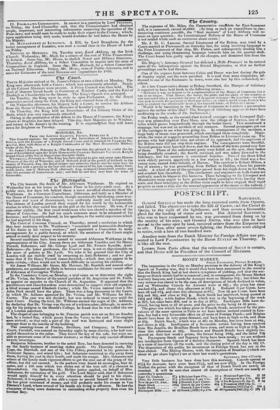Countrv.
The expenses of Mr. Miles, the Conservative candidate fee East Somerset will, it is rumoured, exceed 50,000/. [So long as such an expenditure in electioneering continues possible' the "final measure" of Lord Althorp will remain an open question : the Constitutional Reform of the House of Commons is not settled while such an enormous abuse exists.]
Mr. J. D. C. Lamont, Second Lieutenant of the Briton, was tried by a Court-martial at Portsmouth on Saturday last, for using insulting language to the First Lieutenant of that ship, Mr. Patten, and subsequently sending him a challenge, and using threatening language towards him on the quarter•deek. The Court found him guilty upon all the charges, and dismissed him from the service.
His Majesty's Attorney-General has directed a Nolle Prosequi to be entered upon all the informations against the Bristol Magistrates, so that no further proceedings can be had thereon.
One of the express boats between Calais and Dover was lost during the gale of Sunday night, and the crew perished. It is said that some despatches, addressed to one of the Embassies in town, were also lost by this melancholy accident.
At a late Conservative dinner at HishopStortford, the Marquis of Salisbury is reported to have held forth in the following strain
" Hitherto it was on honour to be a representative of the House of Commons, but it was so no longer. That House, the boast, the pride, and the glory of the country, is now converted into a receptacle for men of desperate fortunes—for gamblers—for those who seek to evade the payment of their just debts ; or what is much worse, tbr men who seek to promote the abominable devices, the knavish tricks. of Political Unions,'
[Would it be becoming in the House of Commons to institute a prosecution against the author of this libel ? The Marquis of Salisbury appears to have been meditating on the works of Dr., Sacheverell.]
On Friday week, as the wend class train of carriages on the Liverpool Railway was proceeding over Parr Moss, near the village of Newton, one of the tubes which passes longitudinally through the boiler burst. This Occasioned a stoppage, but was not an accident of any moment. Several passengers got out of the carriages to see what was going on. In consequence of the accident, a large body of steam was generated, which enveloped them completely. Meanwhile, the train of waggons proceeding from Bolton to Liverpool came up. The person; who had alighted were not aware of its approach, and the engineers of the Bolton train (lid not stop their engines. The consequences were dreadful. Several persons were knocked down, and the wheels of the train passed over four of them. Three of the unfortunate party were killed on the spot, their bodies being dreadfully crushed ; the fourth survived, and was taken 'forward to the Infirmary, but his recovery is considered hopeless. Tivo of the three killed were elderly persons, apparently in a low station in life; the third was a fine young man, named John Scholes; of Barton. The survivor is Robert•Hilton, a boy of sixteen ; he was proceeding from Belfast to Halifax, where his parents reside. A wheel of one of the carriages passed from his thigh down to his foot, and crushed him dreadfully. [The conductors and engineers on both trains are evidently much to blame in this business. Those belonging to time Liverpool and Manchester train ought to have prevented their passengers from leaving their seats, and those belonging to the Bolton train ought to have stopped their rapid progress as soon as they saw the unusual appearance of the steam on the railway.]


















 Previous page
Previous page